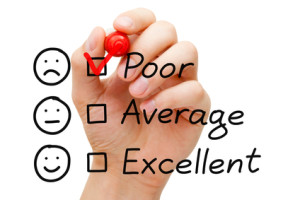 It is likely you have had an experience like this in your past:
It is likely you have had an experience like this in your past:
You are 8 or 10 or 12 years old. You’ve done something wrong, but maybe you don’t know what just yet. However, you certainly know you are in hot water after you have been told to “Stay after class,” “Go to the office” or “Wait until your father gets home.”
Whatever the offense, the event goes about the same. You are told what you did, why it is wrong, and what you need to do differently. The person in charge informed you of the situation and did most, if not all, the talking. The whole thing was difficult and painful. You remember it, but not fondly.
Now think about your past performance reviews.
Do any of them resemble, in part or in total, those experiences as a kid? Even if your review was somewhat or largely positive, isn’t there still a similar feel? There is a “judge,” (your boss likely) and then there is you, listening to the verdict.
No wonder performance reviews have such a bad name. Ensure that yours are meaningful to your employees by following this advice:
- Remember the purpose of reviews. The goal isn’t to fill out a form or satisfy HR. The goal is to improve employees work and aid in their growth. When you remember that, and let others know that is your focus, you will improve results immediately.
- Make it a review, not an evaluation. Think about your worst reviews and those sit-downs with authority as a kid. Those were evaluations, and how did that work? You can review performance without it feeling punitive or like a report card. When you do that, it will likely be more effective. Scratch the word “evaluation,” and make it a “review.”
- Find ways to make reviews less stressful. If the process is about coaching, it is about learning, and the best learning experiences are seldom high stress. Help people relax. Let them know that you realize the situation might feel stressful to them. Remind them that your goal is to remove as much of that stress as you can.
- Look forward, not just backward. Most reviews look at what has already happened, and no one can change what is in the past. To coach employees, you need to put the past in context and focus at least some of your conversation on what they can change “next time.”
- Let employees talk first. They have an opinion about their performance and results. They have intimate experience with it, and while their perspective might be different than yours, their perspective matters. When they share that they wish something could have gone better, you don’t have to convince them of that fact, they already own it. So let them talk. First.
- Reduce defensiveness to improve results. Once people get defensive, the barriers are up, and they aren’t interested in getting “helpful advice” from others, even the boss. If you let them talk more and sooner in the conversation, you will melt much of the defensiveness that occurs when you speak first and focus only on their weaknesses.
- Help them own their performance. You may be conducting the review, but it is a review about their performance. It isn’t about you. Keep that in mind, and make the entire exercise about your employees taking accountability for their performance, results and improvement.
- Make it a conversation. In order to make all the other principles listed work, you must be quiet and talk less. A common thread in people’s poor experiences is that they were talked down to and that they weren’t engaged. When you turn a “review” into a conversation – open to the opinions and views of both parties – you will ensure better results.
These principles are profoundly powerful. As you apply them with care and practice, you will create more effective performance conversations, higher levels of trust, and ultimately greater performance, which is what you were after in the first place.

0 comments